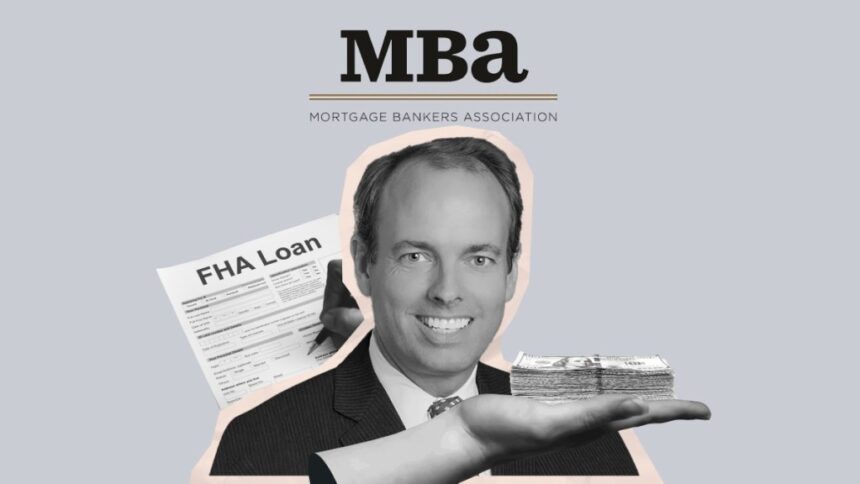
Alleviating the country’s housing challenges looks to be top of mind for the Trump administration. In an executive order signed by the president on his first day back in office, Donald Trump called upon the heads of all executive departments and agencies “to deliver emergency price relief, consistent with applicable law, to the American people” in an effort to improve the nation’s housing supply and affordability challenges.
Although much of the power to improve housing supply lies with state and local governments — due to the structures of the nation’s zoning laws — the Mortgage Bankers Association (MBA) believes it has a way to improve housing affordability and availability. The trade group is calling for a “reasonable reduction” in mortgage insurance premiums on Federal Housing Administration (FHA) loans.
“The general deregulatory bent of the new administration, we think, will be very helpful in bringing down some costs in the origination process. Over the next months and years of this administration, we expect an easing of the regulatory burden,” Bob Broeksmit, the MBA’s president and CEO, said on a recent episode of the HousingWire Daily podcast.
“Even more immediately, though, we believe the administration could very quickly make good on this pledge, this commitment to lower costs in housing, by taking a very serious look at the mortgage insurance premium for FHA loans, both on the single-family side and the multifamily side for affordable apartments and affordable rentals,” he added.
Advocating for change
Mortgage insurance is typically required for borrowers with a down payment of less than 20%, meaning that it is necessary for FHA borrowers, who can qualify with as little as 3.5% down. Borrowers pay upfront based on a percentage of the closed loan amount and as part of their monthly mortgage payment. The insurance protects the lender in the event that the foreclosure sale of a property is not enough to cover the borrower’s outstanding mortgage balance in full.
“If, for instance, the mortgage insurance premium drops by 25 basis points, that would flow straight through to the interest rate and the monthly payment for FHA borrowers,” Broeksmit said. “This can be done by the Department of Housing and Urban Development (HUD). It doesn’t require any legislation, and it can be done quickly and it can reverse this situation we are in now.”
The MBA is not the only housing industry trade group advocating for a reduction in mortgage insurance premiums.
“With elevated home prices and mortgage rates, first-time and low- to moderate-income buyers are struggling to break into the market,” a spokesperson for the National Association of Realtors (NAR) wrote in an email. “Prudent reductions to the FHA mortgage insurance premiums have the potential to alleviate some of the financial stress these potential buyers encounter when purchasing a home.”
Despite the trade groups advocating for the reduction, their own data shows that any cut in premiums would only impact a small pool of buyers. In December 2024, FHA loans accounted for 29% of mortgage applications for new homes, according to an MBA survey of homebuilders. Additionally, NAR reported that in 2024, 29% of first-time homebuyers used an FHA loan for their purchase. This is down from 55% in 2009.
Brian Huskey, the associate broker of Montana-based ERA American Real Estate, has witnessed firsthand the decrease in the number of FHA buyers.
“We don’t see a whole lot of FHA buyers,” he said. “It is probably down 20% from where it was pre-pandemic.”
Huskey attributes the decline in FHA buyers to the ability to get a conventional loan with 3% to 5% down, concerns about regulatory hiccups with FHA loans, and the struggle of FHA buyers to compete in the post-pandemic housing market. He also said he is seeing buyers becoming more savvy about the various fees involved with different loan products, and he suggested that added fees like mortgage insurance premiums may be causing some buyers to shy away from FHA loans if they have other options.
According to Chen Zhao, the head of economics research at Redfin, while the federal government has little power over zoning decisions, they have plenty on the housing finance side.
“I think there is definitely a case where the heads of these agencies can explore ways to reduce some of these fees, but the margins on those are pretty small relative to the overall cost of the home. It is really the price of the home and the mortgage rate that are the main drivers of affordability,” Zhao said. “So, yes, you can reduce the mortgage insurance premium, but it is not going to affect that many households. It is a drop in the bucket compared to what a reduction in mortgage rates would cause.”
Craig Garcia, the president of Capital Partners Mortgage Services, expresses a similar view to Zhao. “I think a reduction could certainly help, but it is not going to drastically change someone’s world in terms of their payment or what they can qualify for,” he said.
‘Every dollar counts’
In Garcia’s home state of Florida, the mortgage insurance premium on a $430,000 single-family home would cost a borrower $192 a month, which he said represents less than 10% of their monthly payment and is much less than their property taxes and homeowners insurance.
But Huskey warns not to underestimate the impact that even a $100-per-month premium reduction could have on an FHA borrower.
“A lot of FHA buyers are very payment sensitive,” Huskey said. “They are working paycheck to paycheck to afford a certain amount of things. So, I think anything we can do to help those buyers fit more housing into their budgets is going to be better for them.”
Chrissy Brown, the chief operating officer of Atlantic Bay Mortgage, shares a similar view.
“When you finally get around to finding something that is in an affordable range, what we are seeing is that it sometimes comes down to just barely being able to meet those marks, and if you can move the needle even just a little bit, it will help those buyers qualify for the loan,” Brown said. “Every dollar counts.”
While it is hard to argue with anything that could help improve housing affordability — especially for first-time, low-income or minority homebuyers — FHA borrowers are not the only ones who would be impacted by a reduction in mortgage insurance premiums.
“The FHA can only perform its countercyclical role in the market as it capitalized well enough to be a source of strength when there is economic stress. Also, it is important to recognize that when a loan is insured by the FHA, the taxpayers are standing behind 100% of that loan,” said Seth Appleton, the president of U.S. Mortgage Insurers and a former assistant secretary of HUD.
“There are a lot of us that have always believed that private capital should protect against credit risk ahead of taxpayers whenever possible, so we would really encourage policymakers to keep that in mind. After the financial crisis, the mutual mortgage insurance (MMI) fund operated below that 2% requirement for a number of years and even went negative in 2013, resulting in it drawing $1.7 billion from the Treasury and effectively got bailed out by the taxpayers.”
The FHA is currently reporting a capital position for the MMI Fund that is much higher than its statutory minimum requirement of 2%, which was established back in 1990. But Appleton said there are a couple of warning signs in the FHA’s numbers. One red flag Appleton sees is that the share of FHA borrowers with past-due payments in November 2024 was more than 13%.
“That is many multiples of the conventional loan market,” Appleton said.
He also noted that in the third quarter of 2024, mortgage delinquencies for FHA loans exceeded 10%, compared to 2.6% for the conventional loans handled by Fannie Mae and Freddie Mac.
Brown, however, disagrees with Appleton’s assessment of the potential risks.
“The mutual mortgage insurance fund is highly capitalized,” Brown said. “From a risk perspective, there is not really a risk in reducing premiums.”
While Brown agrees with Appleton that the minimum reserve requirement should be higher than the current 2% minimum, she thinks that its Q3 2024 reading of 11.47% is more than enough to offset the current level of risk.
“Delinquencies are going down, but the MMI is still going up,” Brown said. “It is just so high now that there should be room and a cushion to reduce premiums to help the affordability issue.”
As federal agencies ponder ways in which they can help ease the nation’s housing challenges, it remains to be seen whether they will consider a reduction to mortgage insurance premiums as a means to achieve their goals.






